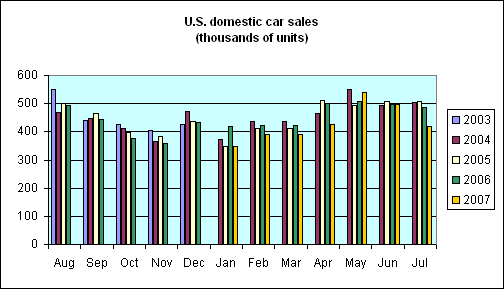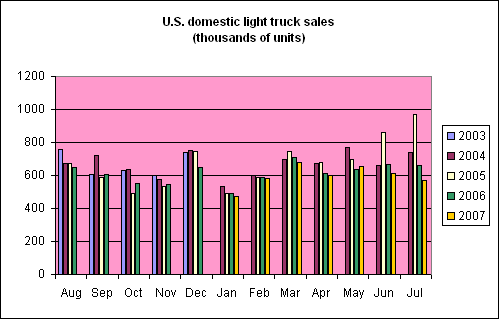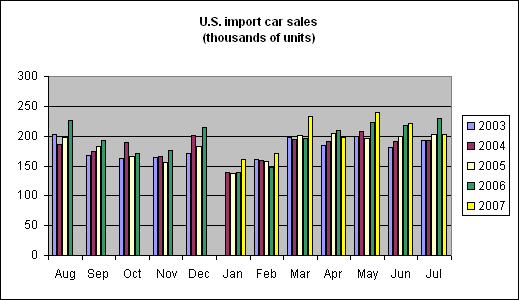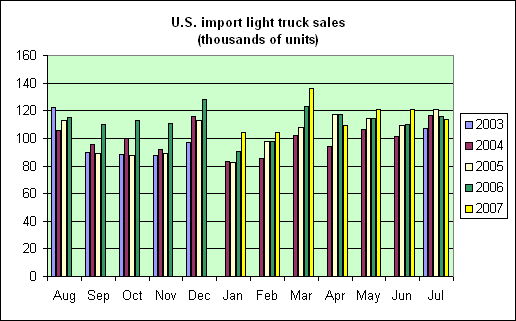This is not just another bad sales month.
July seasonally unadjusted sales of cars manufactured in North America were down 14% from the previous July and down 17% from July 2004.
 |
Domestic light truck sales were down 13% year-to-year and 23% over four years.
 |
High gasoline prices often hurt sales of domestics relative to imports, but a weak overall economy would bring down both. The recent trend of rising import sales was reversed in July for both cars and light trucks:
 |
 |
The Wall Street Journal reported that July auto sales overall were the worst in 9 years.
Putting this together with what I read as a distinct turn for the worse in a housing downturn that has become longer and deeper than I would have expected for a “soft landing” leads me to repeat my suggestion that it is time to move the fed funds target back to 5%.
Technorati Tags: macroeconomics,
autos,
auto sales
One contrary point on the auto sales is that for three of the four data series (all but domestic light truck sales), May and June 2007 were quite strong relative to May and June 2006. I’m not sure that one datapoint makes a trend, in this case.
Housing and mortgages are another matter. Lyle Gramley’s been saying that this mortgage market is as bad as anything he’s seen, (and he’s seen a lot!) and that you have to go all the way back to the 1970s to find an environment like it.
Then yesterday there were rumors going around that Beazer Homes was going under and the shares fell from $14 to $8.10 before recovering a bit to close at $11.48.
The Fed’s in a bit of a bind – because if they were to ease now (which given the lags in policy impact would probably be a good idea for the real economy), they would likely be seen as bailing out the highly leveraged hedge fund financiers. And Dr. Bernanke should be smart enough to want to avoid that perception. Because one important reason that highly leveraged finance has gotten out of hand is that the real or imagined generous terms of the “Greenspan Put” created a moral hazard in behavioral terms. Bailing out LTCM and its lenders might have been the smart thing to do in 1998 to avoid any risk of systemic collapse (though reasonable people can disagree), but it helped get us to where we are NOW.
LTCM was “only” a $4 billion fund with $100 billion of exposure – NOW we have multiple funds with $50-$100 billion in capital and $1+ trillion of exposure. All doing the same thing the same way with ridiculous leverage, albeit 10-20 to 1 rather than LTCM’s 25 to 1.
The FOMC meets next week and at the moment the informed consensus is that they do nothing but change their language back to a neutral posture, though maybe with a caveat stuck in that vigilant monitoring of credit conditions is warranted. We’ll see.
IMHO, this is shaping up as a great buying opportunity for long-term investors, but timing is everything — I wouldn’t be buying until the moment the Fed capitulates and eases aggressively and it could be several weeks or months before that happens . . . . . in fact, it may take a financial crisis to provoke them – like Continental Illinois in the summer of ’84, or the stock market crash of 10/19/87 or the bank real estate debacle of spring/summer/fall 1990 or LTCM in 1998 . . . . . .
How do the numbers for “12 months ending July 2007” compare to those for “12 months ending July 2006”?
May 2007, for example, was very high compared to previous Mays, implying that the automakers may have pulled forward some demand.
“Same month last year” numbers are useless to me, because they ignore the sales efforts that may have been in effect last year, and last month.
Why not use “trailing twelve month” numbers like some other industries use?
I like your four year graphs, Professor: shows the trend and eliminates the seasonality.
The end (big economic slowdown) is here. Store those seeds and nuts, ’cause it is going to be a long, long winter.
I have been told there is a high correlation between home purchases, values, or equity (I can’t remember what) and (specifically) pick up truck sales. Might be interesting to look into.
we’re just starting to see savings increase with rates at the levels right? seems to me that rates being too low for too long is what got us where we are now.
admit that i’m a neophite here, with an outdated econ BS but more “i’m from the fed and i’m here to help” just seems a bit premature to me.
Anarchus…
We are once again near that point where our central bank can deliver a knockout punch to inflation by simply doing nothing for perhaps a year. And what a refreshing change it would be for the moral hazard loving gang to end up with an empty bag.
Such a disappointment that the university-based economist community seems to be in the inflation forever gang. But that IS where they are. (Would make a nice lapel button, don’t you think…’Inflation Forever!)
“it is time to move the fed funds target back to 5%”
Not with the Euro over a $1.35. This is not a one dimensional game.
Professor,
I would still like to see more analysis comparing the domestic and international markets. Perhaps it exists but I just don’t know where to look. There is evidence to indicate that the sluggish economy is more a US problem than a world problem.
GM sales growing globally despite domestic setbacks
By Sharon Terlep
MediaNews
Article Launched: 07/20/2007 01:36:24 AM PDT
General Motors is shattering sales records, besting competitors and making money almost everywhere in the world.
Those successes will amount to little, however, if the automaker can’t resuscitate sales in its money-losing North American operation – something GM says isn’t likely until at least 2008.
GM sold 2.4 million vehicles around the world in the second quarter, with 1.4 million of those cars and trucks going to consumers outside the United States, according to sales data released Thursday.
On a worldwide basis, 2007 is shaping up to be the second-best sales year in GM’s history. Take the United States out of the equation, and GM shattered its quarterly sales record.
http://origin1.contracostatimes.com/cars/ci_6420675
righto, esb.
my concern is that the academically-minded FOMC crew is in exactly the same camp with the “the university-based economist community . . . . in the inflation forever [mindset].”
IF the Fed does absolutely nothing for a year, they MIGHT deliver such a knockout blow to inflation that we slump all the way into a deflationary recession, which is a significantly suboptimal outcome. Just one investor’s opinion, but I also think if the Fed does nothing for another 4 months we’d lose a fairly significant financial institution or two.
Next week’s meeting will be pretty interesting . . . . . .
esb and others, a less than 2% real GDP growth rate is not going to send us spiralling into hyperinflation. Nor is a less than 0% real GDP growth rate the most effective long run strategy for keeping inflation down. In urging the Fed to try to keep GDP growth positive, I am not, in my opinion, advocating inflationary policies.
JDH, I can’t speak for esb, but my reading of his comment and my perception of the university-based economic community is that broadly speaking they’re over-concerned about inflation.
Your position, as I understand it, is almost the polar opposite of that – that the Fed needs to cut rates NOW to keep GDP growth positive and given the absolute collapse of the housing/mortgage economy, the easing is extremely unlikely to foster inflation. In fact, I suspect that without an easing in the next six months we’d likely see deflation in 2008.
Yes sales are down in the U.S. But wait, there’s more.
It’s official: General Motors and Ford Motor Company have decided that the marketplace will not be sufficient to move their product mixes toward more efficient vehicles and are supporting government action to force them to make more efficient vehicles.
All right, that’s not exactly the case. It’s like giving the Don his payment or receiving a pair of concrete shoes. Do I hear a third choice?
We’ve already seen the marketplace shift dramatically toward more fuel efficient vehicles, but this seems to be a case where legislators can claim to be heroes for saving our environment while automakers can point fingers at Congress when consumers see the prices for all of the new technology… and ask what happened to the performance they wanted. I guess it’s a win-win.
I can just hear the conversations at Ford and GM…. We can do that, we can do that, we can do that… how the hell are we going to do that?
This is quite an example of a few “enlightened leaders” telling everyone what they want, when they want it, and how they want it… and not trusting worldwide competitive pressures to deliver it.
I just don’t understand this obsession with connecting growth with inflation. For centuries economists have known that prosperity, an increase in goods, may lead to price declines, but if you have a proper definition of deflation additional goods do not create deflation. This whole debate over growth, inflation, and deflation seems to be based in topsy-turvy economics.
DickF, I am not suggesting a simple relation between growth and inflation. Monetary policy affects the economy through aggregate demand. The reason we are seeing slow growth at the moment is because of slow growth of aggregate demand. In the current environment, the growth rate is a reasonable summary of the direction in which monetary policy is moving the economy. This does not mean that I always, in other situations, would view the growth rate as the appropriate summary of monetary policy.
My point is just as Anarchus said– I believe monetary policy at the moment is exerting a considerable contractionary influence, and if aggregate demand has been crunched so much that we actually see negative real GDP growth (which is my concern), then it has gone too far.
If anyone’s forgotten to check lately, the folks over at Calculated Risk are rocking and rolling with the rapid-fire mortgage developments of the past week.
The environment’s getting worse, faster, than most observers expected. Though his books are almost unreadable, this really is Soros’ badly-named “Theory of Reflexivity” in action . . . . . . . . on the way up in a boom driven by easy access to financing, all of the actions taken tend to reinforce the boom which ends up going to ridiculous heights because of the self-reinforcing nature of the process (in simple terms, easy credit pushes asset prices up, which makes the once-frowned-on easy credit look smart, which begets even easier credit, etc etc) . . . . . . but once clearly past the peak, the unwinding process self-reinforces its own decline, and each incrementally more prudent action taken by participants accelerates the collapse and eventually ends up making the bottom that much lower. Keep your eye on Calculated Risk, they’re right on top of the debacle.
My continuing concern about this near-crisis is that the Fed may wait to act until the economic data clearly turns negative . . . . . . which is highly sub-optimal since (a) good economic data only comes out with a 1-2 month lag, so real-time conditions may be really awful by the time the first good data shows a negative trend, and (b) monetary policy only impacts the real economy with an uncertain lag anyway. Interesting times, these . . . . .
Professor,
Thanks for clearing that up. I actually was not addressing my comments to you though it is nice to hear the comment directly from you.
I am more concerned with the mainstream media those who enter into the most homes in the country. I hear this same mantra repeated in conversations at least once a week and it is like pulling teeth to get people to understand that growth does not mean inflation.
I just hope the people posting hear understand.
By your own numbers, there is a 75% probability that no recession will occur. Overall inflation is 4% – too high. With low probability of recession, why are you concerned about Fed rates?
No Mike, by my calculations there is approximately a 75% probability that the recession had not begun as of 2007:Q1. I have not offered a probability on whether a recession might begin some time later in 2007.
JDH, I’m not going to let you duck this one by living in data that is 6 months old, claiming a gap in current knowledge, and making recommendations for future action. Decision makers can’t do that, as you know. Sorry. 🙂
Mike, you seem to have a habit of making the same off-topic point on different threads. Since this is the same issue you raised elsewhere, let me, for benefit of people who are reading this thread and not the other, repeat here the answer I gave you earlier.
The most authoritative source most people turn to for an a determination of whether the economy currently is or is not in a recession is the Business Cycle Dating Committee of the National Bureau of Economic Research. Their most recent announcement was made in July 2003, at which point they declared that the recent U.S. recession ended in November 2001. I remember talking to a reporter in January, 2003, telling him that the recession was over, and he looked at me like I was an alien from Mars who knew nothing. Much of the political debate in the fall of 2002 seemed to presume that a recession was still going on.
I therefore believe there is considerable value in trying to make these declarations in a more timely fashion than does the NBER. However, I think the fundamental nature of the problem does require you to collect sufficient data to be confident in your call. Using this index approach, I expect to be able to make the declarations of when a recession begins and ends sooner than NBER does, but not a whole lot sooner. I do believe there is some value in this exer cise, though I agree that it is not quite as exciting as what you originally supposed I may have been doing, namely predicting when the next recession will begin.
Off topic? The topic of this posting is your suggestion that Bernanke should cut the Fed funds rate to 5%. I just pointed out that, IMO, the logic of that suggestion doesn’t hold up – given your postings in several places. Surely, you don’t think slow sales of US manufactured autos alone is reason to cut Fed funds. I thought I was on this topic. Now you bring up recession start and stop dates. ?